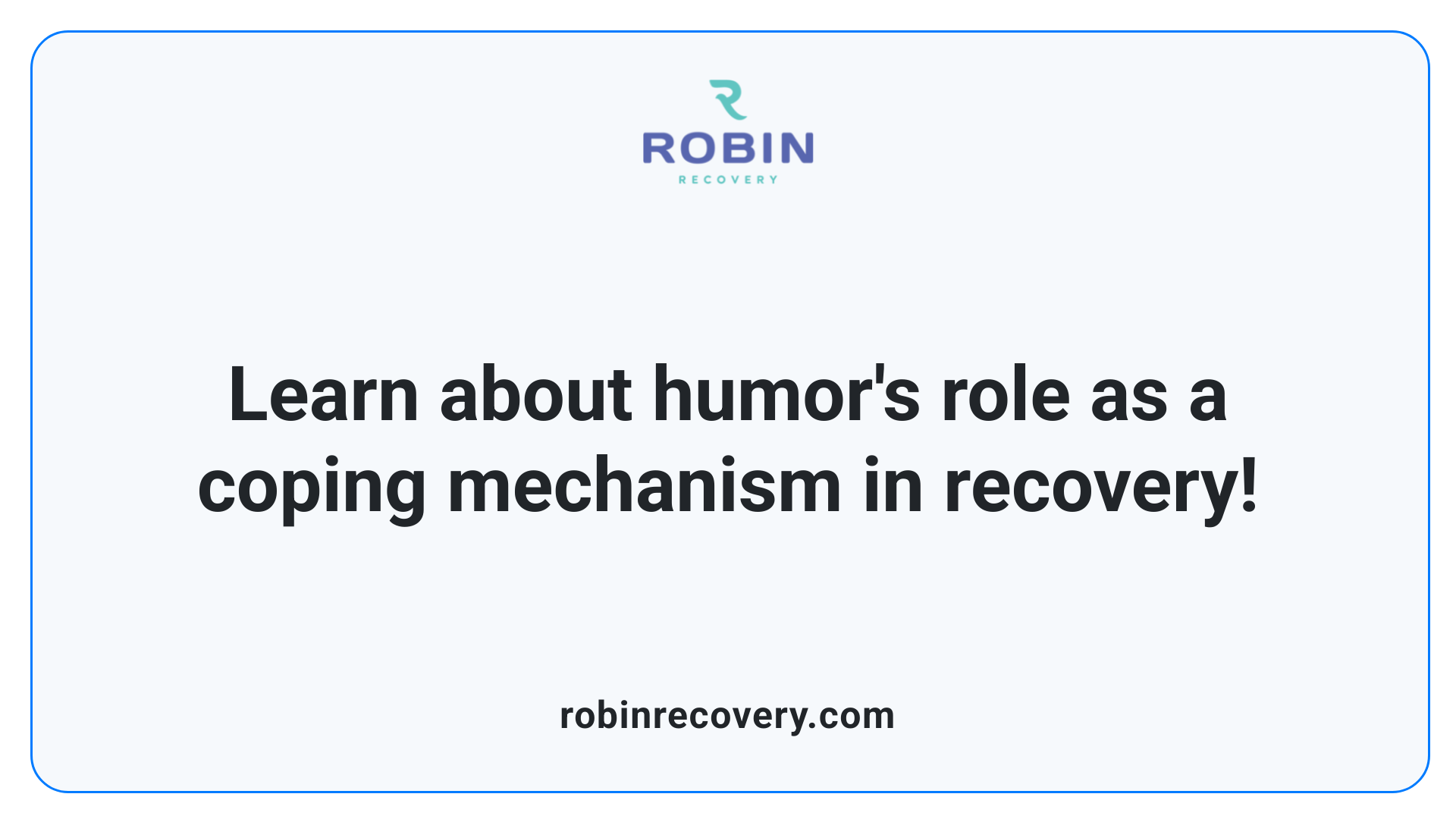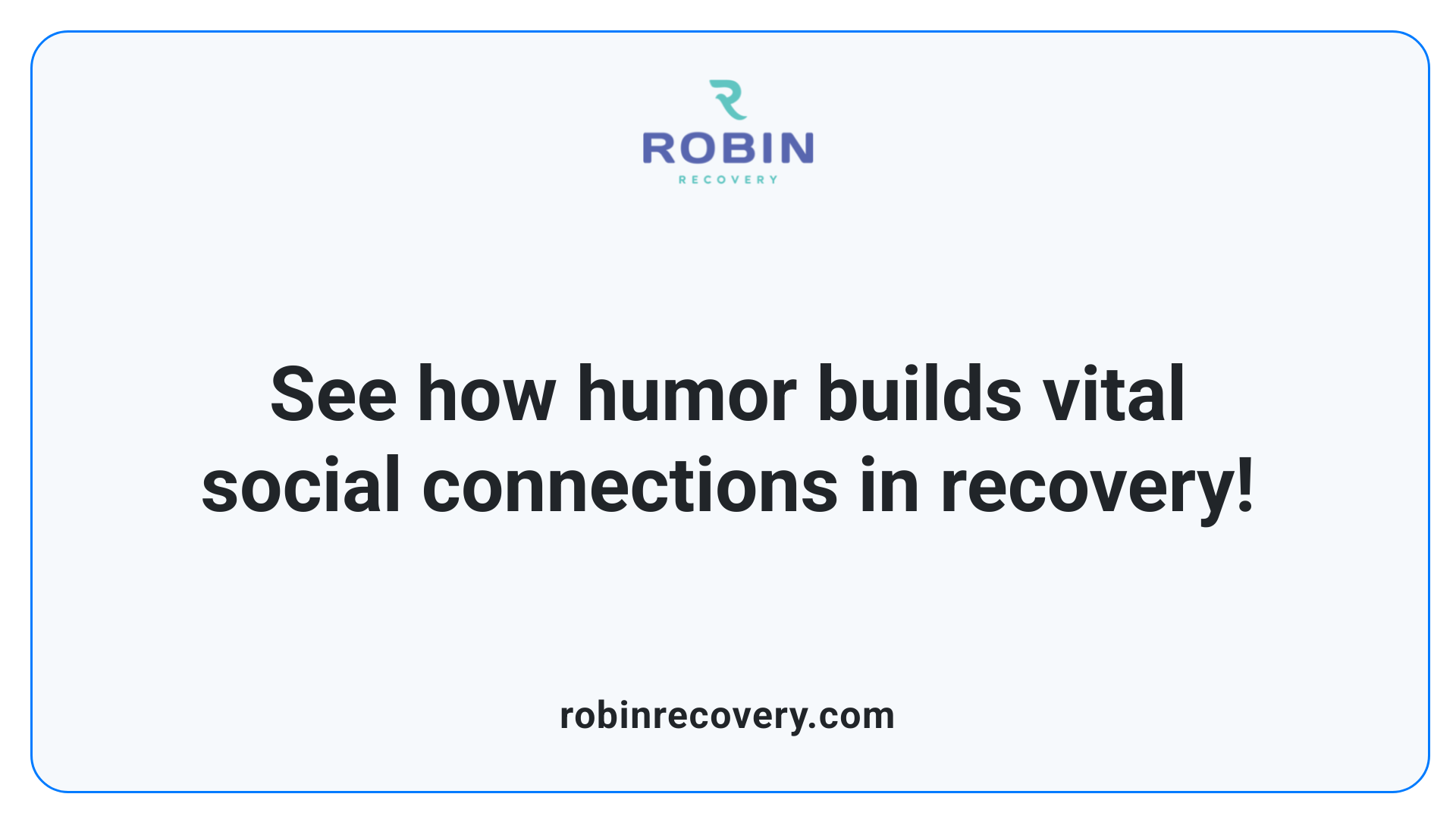The Role of Humor and Positivity in Recovery

Introduction
In the challenging path of addiction recovery, humor emerges as a transformative force, offering both psychological and physical benefits. Far more than just a fleeting moment of laughter, humor can remodel the recovery process, bringing lightness to serious moments, fostering social bonds, and aiding emotional healing. This exploration delves into understanding how humor and positivity can be woven into the fabric of recovery journeys, fundamentally altering experiences for those seeking sobriety.
The Therapeutic Power of Humor

What are the therapeutic benefits of humor in addiction recovery?
Humor plays a crucial role in addiction recovery by enhancing emotional resilience, reducing stress, and fostering a sense of belonging among individuals in recovery groups. It positively impacts communication between counselors and clients, making therapy sessions more engaging and less intimidating.
Humor also allows individuals to reframe negative experiences, turning challenging situations into cognitive surprises that facilitate learning the principles of recovery. This transformation encourages self-reflection and helps clients to develop healthier coping mechanisms.
Furthermore, laughter acts as a natural mood enhancer by positively influencing dopamine and serotonin levels, which contribute to overall well-being. Regular integration of humor in therapeutic settings not only bolsters rapport but also reduces client resistance, enabling open discussions about past challenges.
Incorporating humor strategically in therapy enriches the recovery atmosphere, allowing individuals to share their experiences with levity, and paving the way for a supportive environment crucial for healing. Overall, humor serves as a vital therapeutic tool, promoting resilience, connection, and emotional strength that are essential for sustainable recovery.
Laughter as a Catalyst for Emotional Growth

How does laughter aid in emotional healing and personal growth during recovery?
Laughter plays a significant role in emotional healing and personal growth during recovery by reducing stress and anxiety, which are common challenges faced by individuals. It releases endorphins, enhancing mood and promoting a sense of well-being, while also increasing pain tolerance and improving self-esteem.
Moreover, humor fosters social connections by breaking down barriers and reducing feelings of loneliness, essential for building support networks throughout the recovery process. Shared laughter can ease tensions in group settings, enhancing trust and openness among peers. Incorporating humor into daily routines can create moments of joy and perspective, thereby easing tension and encouraging resilience.
The Release of Endorphins and Mood Enhancement
Laughter triggers the release of endorphins, the body's natural feel-good chemicals, which elevates mood and contributes to overall emotional well-being. This boost in endorphins is crucial during recovery when individuals may struggle with negative thoughts and feelings. The act of laughing helps alleviate these burdens, making therapy and recovery processes feel less daunting and more accessible.
Engaging in humorous activities, whether through watching a comedy or sharing funny stories, yields immediate emotional benefits that enhance one's outlook on recovery.
Emotional Connections and Resilience
Incorporating humor encourages a more connected recovery journey, as it creates positive interactions among individuals. Laughing together strengthens social bonds, offering a supportive platform for sharing challenges and triumphs in recovery. The ability to find humor in stressful situations fosters resilience, allowing individuals to navigate their emotional landscapes with a lighter heart.
Overall, laughter serves as a powerful natural stress-buster, enhancing emotional well-being and supporting the recovery journey.
Humor as a Coping Mechanism

What is the role of humor as a coping mechanism in addiction recovery and what are its psychological benefits?
Humor emerges as a powerful coping mechanism in addiction recovery, significantly aiding individuals in managing stress and anxiety. It not only enhances emotional resilience but also elevates mood, creating a foundation for a more positive recovery experience.
Through shared laughter, participants in recovery groups cultivate trust and camaraderie, fostering an atmosphere that encourages open communication. This supportive environment helps individuals feel less isolated, making it easier to discuss their challenges and progress.
Moreover, humor allows for a reframing of negative experiences, shifting the focus from feelings of guilt and shame to a perspective centered around joy and connection. This process is crucial as it relieves emotional burdens and encourages a lighter outlook on recovery.
Laughter also triggers the release of endorphins, which contribute to an improved sense of well-being. It’s important to integrate humor with other therapeutic approaches, blending laughter with more structured interventions for a comprehensive recovery journey.
Strategies for Infusing Humor into Recovery

What are some practical strategies for incorporating humor into the addiction recovery journey?
Incorporating humor into the addiction recovery journey can enhance well-being significantly. Engaging in comedy-based activities, such as attending stand-up shows or participating in comedy classes, promotes laughter and joy.
Sharing funny experiences within support groups fosters a spirit of camaraderie. This helps break the ice and creates a relaxed atmosphere that encourages open communication.
Watching comedies or humorous films can uplift spirits, while practicing laughter yoga provides both physical exercise and joyful engagement.
Building connections through laughter
Humor is a powerful tool for building interpersonal connections. Sharing jokes and light-hearted stories in therapy or group settings cultivates trust among participants. These shared laughs can ease tensions and facilitate deeper conversations, making it easier to address more serious issues.
Comedy as therapy
Comedy can serve as an informal therapy. It allows individuals to diffuse stress and fosters a positive outlook. Using humor as a coping mechanism enables individuals to reframe difficult situations, enabling better resilience against the stresses of recovery. Overall, finding joy through humor can significantly enrich the recovery process, while providing relief and support.
Connecting Through Laughter

How does humor contribute to building social connections among individuals recovering from addiction?
Humor plays a crucial role in building social connections among individuals recovering from addiction. It breaks down barriers and fosters open communication, creating an environment where vulnerability is welcomed. Shared laughter not only alleviates stress but also enhances psychological well-being, which is essential for forming supportive recovery networks.
Through humor, individuals can transform painful experiences into moments of empowerment, promoting a shared understanding. This camaraderie is vital for those in recovery, as it reassures them they are not alone in their journeys. In therapeutic settings, humor facilitates rapport between counselors and clients, leading to a trusting environment that nurtures healing.
The incorporation of humor in recovery programs can significantly strengthen bonds among participants. Group therapy sessions infused with laughter often feel more engaging, making it easier for members to connect and support one another. Overall, humor enhances emotional health and builds a stronger community, laying the foundations for lasting recovery.
Risks and Considerations
Are there any risks or considerations when using humor in addiction treatment settings?
Using humor in addiction treatment can provide significant benefits, improving communication and trust between patients and healthcare providers. However, it’s crucial to apply humor thoughtfully, tailored to each individual's experiences. Some patients may find certain types of humor triggering or inappropriate, potentially jeopardizing their sense of safety in therapy.
Potential pitfalls of humor in therapy
While adaptive humor can foster camaraderie and ease sharing of painful experiences, maladaptive humor may lead to misunderstandings or reinforce negative feelings. For instance, humor that trivializes addiction or makes light of an individual’s struggles can alienate clients and detract from the healing process.
Balancing humor with seriousness
It’s essential to balance humor with the gravity of addiction recovery. Practitioners should ensure that humor complements therapeutic strategies, addressing serious emotions and issues rather than overshadowing them. This approach respects the diverse emotional landscapes clients navigate, ensuring they feel both supported and understood during their recovery journey.
Conclusion
Integrating humor and positivity into addiction recovery offers diverse benefits, from enhancing emotional resilience and fostering social bonds to improving therapeutic interactions. By strategically incorporating laughter into recovery pathways, individuals can transform their experiences, making the journey towards sobriety not just bearable but truly rewarding. The careful balance of humor and serious intervention encourages new perspectives, facilitates emotional growth, and builds a supportive network vital for long-term recovery success.
